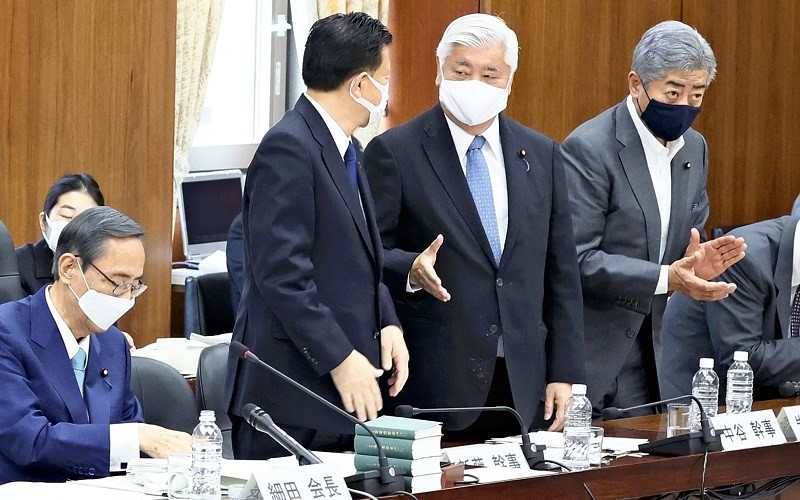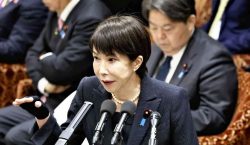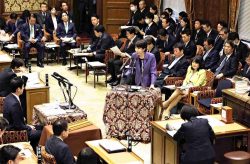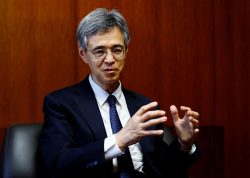
Former Defense Minister Gen Nakatani, second from right, congratulates Liberal Democratic Party lawmaker Yoshitaka Shindo, third from right, at the House of Representatives Commission on the Constitution on Thursda
12:44 JST, May 8, 2021
Three years after it was submitted to the Diet, a bill to revise the National Referendum Law — which would make it easier to hold a referendum on amendments to the Constitution — finally has a pathway to being passed. The ruling Liberal Democratic Party is keen to advance discussions on specific elements of the Constitution, but the hurdles to amending the top law remain high.
The LDP and the main opposition Constitutional Democratic Party of Japan agreed Thursday to hold a vote on the bill during the current Diet session. However, lawmakers from both parties lobbed stinging remarks at each other during a session of the House of Representatives Commission on the Constitution that same day.
LDP lower house lawmaker Yoshitaka Shindo did not hold back in criticizing the CDPJ’s approach thus far to the issue. “I urge certain opposition parties to seriously reflect on the way they slighted the spirit of this commission, which holds debates for the sake of the public, away from the political struggle,” Shindo said.
CDPJ lower house member Masato Imai shot back: “It is absolutely not true that my party has dragged this issue out until now due to the political game. I strongly object to your comment.”
The bill to revise the referendum law had been on the agenda for eight consecutive Diet sessions, but has never been voted on. This was because the CDPJ remained opposed to holding a vote on the bill while former Prime Minister Shinzo Abe was in power.
A senior member of the party had said, “We will never hold discussions on the Constitution under the Abe administration.”
The CDPJ’s decision to allow the vote, albeit on condition that certain changes be made, was largely influenced by the opposition Democratic Party for the People, which urged an early vote. This left the CDPJ singing the same tune as only the Japanese Communist Party, which opposed even holding discussions in the commission. The CDPJ had effectively been boxed in.
The upcoming lower house election also figured in the CDPJ’s political calculations, as it hopes to attract conservative votes. “We don’t want to be regarded in the same light as the JCP,” a young CDPJ lawmaker told The Yomiuri Shimbun.
In December, the LDP and CDPJ secretaries general agreed to “reach a conclusion of some sort” on the bill during the current Diet session. In a Yomiuri nationwide mail-in survey conducted between March 9 and April 15, 56% of respondents said it would be better to revise the Constitution.
A growing number of CDPJ members felt that the party had to be more cognizant of public opinion on this issue. “If we keep running away from these discussions, we might end up drawing criticism from our supporters,” a CDPJ member said.
Low priority for Suga
The LDP plans to hold discussions on issues such as TV, radio and other advertising during the referendum campaign period — discussions that the CDPJ had called for — and also get talks on specific changes to the top law into full swing. However, this looks unlikely to proceed smoothly.
At the commission Thursday, CDPJ lower house member Soichiro Okuno insisted the ad discussions are a prerequisite for any move to revise the Constitution. “If that isn’t on the agenda, [the revision draft of the Constitution] can’t be initiated. A national referendum cannot be held,” Okuno said.
A draft amendment of the National Referendum Law stated that restrictions on political ads will be studied, and necessary measures will be taken within three years after the revised law comes into effect.
A senior LDP member was frustrated by the CDPJ’s move, saying: “It’s obvious the CDPJ intends to delay debates on constitutional amendment by continuing these talks on political ads and other issues for three years.”
Nobuyuki Baba, the secretary general of Nippon Ishin no Kai (Japan Innovation Party), which opposed the draft amendment, also blasted the CDPJ’s approach. “I felt the CDPJ clearly intends to obstruct the commission when it holds meetings or discussions,” Baba said to reporters.
On Monday, Prime Minister Yoshihide Suga sent a video message to an assembly of supporters of constitutional revision. Speaking in his capacity as LDP president, Suga said, “Shouldn’t the current Constitution be revised in areas that are out of step with the times or in parts that are inadequate?”
Suga previously had been considered reluctant to change the top law, so his video was clearly aimed at boosting his standing among the conservative wing of the LDP’s support base ahead of the lower house election that must be held by autumn. Some observers also believe Suga’s move was made with an eye on this year’s LDP presidential election.
“He was giving a nod to Mr. Abe and Deputy Prime Minister Taro Aso,” a midranking LDP lawmaker told The Yomiuri Shimbun.
Despite these developments, constitutional revision is not a high priority for the Suga administration. For the time being, Suga has his hands full dealing with the novel coronavirus pandemic. “It will be difficult to push ahead with discussions on changing the Constitution, which could sap the strength of the administration,” a veteran LDP lawmaker said.
4 key revision pillars
In March 2018, the LDP compiled a proposal outlining revisions to the Constitution in four specific areas. These four pillars were the addition of clear legal grounds for the existence of the Self-Defense Forces; a state of emergency clause; eliminating House of Councillors electoral constituencies that combine more than one prefecture; and improving the education system.
In 2020, the wheels started turning on a formal draft text based on these four priority areas, but this move stalled due to opposition from the CDPJ and other parties. One argument these opponents used was that if the LDP went it alone, they could not hold discussions on the Constitution in the Diet.
These four priority revisions were crafted before the spread of the novel coronavirus. The state of emergency clause was assumed to be for handling a large-scale natural disaster such as a massive earthquake; dealing with an infectious disease had not been anticipated.
“The public is very interested in the provision on states of emergency, so as a commission we must deepen discussions on this issue from various perspectives,” LDP lawmaker Yoshitaka Shindo said at the lower house commission on the Constitution on Thursday.
Some LDP members objected to the four revision priorities because they were compiled while Prime Minister Shinzo Abe was in power and LDP president. “I don’t think at all that those four topics were exhaustively discussed within the party,” former LDP Secretary General Shigeru Ishiba said to reporters Thursday.
As the bill to revise the National Referendum Law is likely to be passed, Komeito, the LDP’s coalition partner, will hold a meeting of its research commission on the Constitution as soon as this month and restart discussions on the top law.
Nippon Ishin no Kai has compiled a draft text of proposed amendments to the Constitution, including a provision that would make education free. The Democratic Party for the People has released its key revision issues, including specifying fundamental rights to data that protect an individual’s dignity in an increasingly digitized society.
Top Articles in Politics
-

Japan PM Takaichi’s Cabinet Resigns en Masse
-

Sanae Takaichi Elected Prime Minister of Japan; Keeps All Cabinet Appointees from Previous Term
-

Japan’s Govt to Submit Road Map for Growth Strategy in March, PM Takaichi to Announce in Upcoming Policy Speech
-

LDP Wins Historic Landslide Victory
-

LDP Wins Landslide Victory, Secures Single-party Majority; Ruling Coalition with JIP Poised to Secure Over 300 seats (UPDATE 1)
JN ACCESS RANKING
-

Producer Behind Pop Group XG Arrested for Cocaine Possession
-

Japan PM Takaichi’s Cabinet Resigns en Masse
-

Man Infected with Measles Reportedly Dined at Restaurant in Tokyo Station
-

Israeli Ambassador to Japan Speaks about Japan’s Role in the Reconstruction of Gaza
-

Videos Plagiarized, Reposted with False Subtitles Claiming ‘Ryukyu Belongs to China’; Anti-China False Information Also Posted in Japan
























